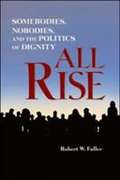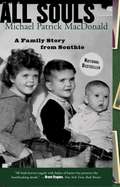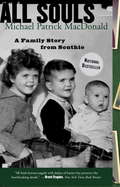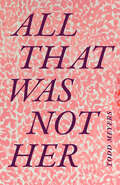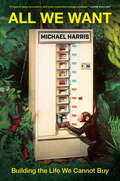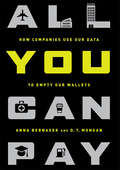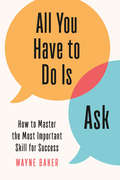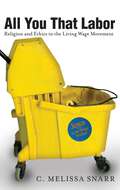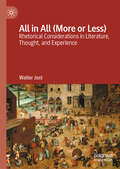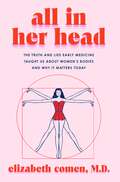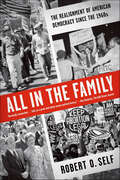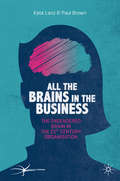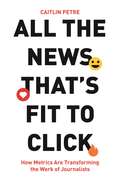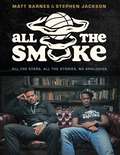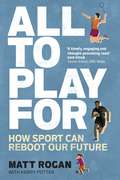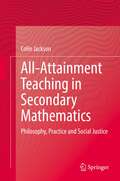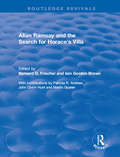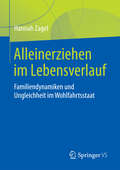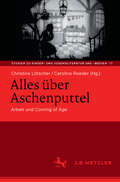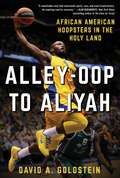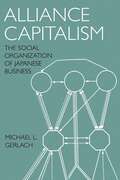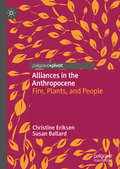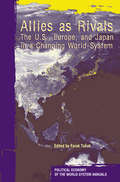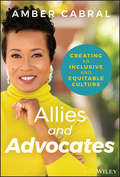- Table View
- List View
All Rise: Somebodies, Nobodies, and the Politics of Dignity
by Robert W. FullerIn his earlier Somebodies and Nobodies: Overcoming the Abuse of Rank (2003), Fuller (former president, Oberlin College) described the social problem of "rankism," a form of abuse of rank analogous to racism, sexism, ageism, and so on. Here he adds more detail about the scope of rankism in society and proposes means of fighting it in pursuit of a "dignitarian society," in which rank still exists, but all are equal in dignity. Annotation ©2006 Book News, Inc., Portland, OR (booknews. com)
All Souls: A Family Story from Southie
by Michael Patrick MacDonaldThe anti-busing riots of 1974 forever changed Southie, Boston's working class Irish community, branding it as a violent, racist enclave. Michael Patrick MacDonald grew up in Southie's Old Colony housing project. He describes the way this world within a world felt to the troubled yet keenly gifted observer he was even as a child: "[as if] we were protected, as if the whole neighborhood was watching our backs for threats, watching for all the enemies we could never really define."But the threats-poverty, drugs, a shadowy gangster world-were real. MacDonald lost four of his siblings to violence and poverty. All Souls is heart-breaking testimony to lives lost too early, and the story of how a place so filled with pain could still be "the best place in the world."We meet Ma, Michael's mini-skirted, accordian-playing, usually single mother who cares for her children—there are eventually eleven—through a combination of high spirits and inspired "getting over." And there are Michael's older siblings—Davey, sweet artist-dreamer; Kevin, child genius of scam; and Frankie, Golden Gloves boxer and neighborhood hero—whose lives are high-wire acts played out in a world of poverty and pride.But too soon Southie becomes a place controlled by resident gangster Whitey Bulger, later revealed to be an FBI informant even as he ran the drug culture that Southie supposedly never had. It was a world primed for the escalation of class violence-and then, with deadly and sickening inevitability, of racial violence that swirled around forced busing. MacDonald, eight years old when the riots hit, gives an explosive account of the asphalt warfare. He tells of feeling "part of it all, part of something bigger than I'd ever imagined, part of something that was on the national news every night."Within a few years-a sequence laid out in All Souls with mesmerizing urgency-the neighborhood's collapse is echoed by the MacDonald family's tragedies. All but destroyed by grief and by the Southie code that doesn't allow him to feel it, MacDonald gets out. His work as a peace activist, first in the all-Black neighborhoods of nearby Roxbury, then back to the Southie he can't help but love, is the powerfully redemptive close to a story that will leave readers utterly shaken and changed.
All Souls: A Family Story from Southie
by Michael Patrick MacdonaldMemoir of an Irish-American boy growing up in South Boston, with a conversation with the author and a reading group guide at the end.
All Souls: A Family Story from Southie
by Michael Patrick MacdonaldA breakaway bestseller since its first printing, All Souls takes us deep into Michael Patrick MacDonald's Southie, the proudly insular neighborhood with the highest concentration of white poverty in America. Rocked by Whitey Bulger's crime schemes and busing riots, MacDonald's Southie is populated by sharply hewn characters like his Ma, a miniskirted, accordion-playing single mother who endures the deaths of four of her eleven children. Nearly suffocated by his grief and his community's code of silence, MacDonald tells his family story here with gritty but moving honesty.
All That Was Not Her (Critical Global Health: Evidence, Efficacy, Ethnography)
by Todd MeyersWhile studying caregiving and chronic illness in families living in situations of economic and social insecurity in Baltimore, anthropologist Todd Meyers met a woman named Beverly. In All That Was Not Her Meyers presents an intimate ethnographic portrait of Beverly, stitching together small moments they shared scattered over months and years and, following her death, into the present. He meditates on the possibilities of writing about someone who is gone—what should be represented, what experiences resist rendering, what ethical challenges exist when studying the lives of others. Meyers considers how chronic illness is bound up in the racialized and socioeconomic conditions of Beverly’s life and explores the stakes of the anthropologist’s engagement with one subject. Even as Meyers struggles to give Beverly the final word, he finds himself unmade alongside her. All That Was Not Her captures the complexity of personal relationships in the field and the difficulty of their ending.
All We Want: Building the Life We Cannot Buy
by Michael HarrisOur lives are defined by a story of endless growth and consumption. Now a climate crisis demands that we change. Can we write new stories? In All We Want, award-winning author Michael Harris dismantles our untenable consumer culture and delivers surprising, heartwarming alternatives. Drawing on the wisdom of philosophers, scientists, and artists, Harris uncovers three realms where humans have always found deeper meaning: the worlds of Craft, the Sublime, and Care. Past attempts to blunt our impact on the environment have simply redirected our consumption—we bought fuel-efficient cars and canvas tote bags. We cannot, however, buy our way out of this crisis. We need, instead, compelling new stories about life's purpose. Part meditation and part manifesto, All We Want is a blazing inquest into the destructive and unfulfilling promise of our consumer society, and a roadmap toward a more humane future.
All You Can Pay: How Companies Use Our Data to Empty Our Wallets
by Anna Bernasek D. T. MonganWhile millions of consumers carry on unaware, powerful companies are racing to gain more knowledge and data than anyone, including any government, has ever had. The goal is to understand consumer behavior and desires, from mundane matters to our most private and intimate affairs. This massive trove of data represents an immense prize for these companies. In economic terms, it is one of the most valuable assets on the planet. In All You Can Pay, Anna Bernasek and D. T. Mongan show how companies use what they know about you to determine how much you are willing to pay for certain products and services. Colleges calculate the price you pay based on the information revealed in the application almost all parents submit for federal aid. Hotels, sports events and health products and services are also using this strategy. The price of everything online-from airline tickets to toilet paper-now fluctuates from moment to moment. Through a toxic combination of price discrimination and cutting-edge technology, sellers can instantly change the price they charge an individual based on their calculations of demand and supply at that point in time. Online stores use your zip code to charge you a different price from someone in another zip code. Bernasek and Mongan offer a dire warning and demonstrate how big data threatens the very icon of the American way: the free market. The ability to understand consumers on a granular level, in real time, and simultaneously to customize the price each person is offered, shifts the balance of power away from the consumer so dramatically that the freedom of markets is at risk. The trend is alarming and, if left unchecked, the destination is clear. Yet consumers and companies can still choose a different path, and in this chilling and illuminating book, Bernasek and Mongan show us how.
All You Have to Do Is Ask: How to Master the Most Important Skill for Success
by Wayne BakerA set of tools for mastering the one skill standing between us and success: the ability to ask for the things we need to succeed. Imagine you&’re on a deadline for a big project, and feeling overwhelmed. Or you're looking for a job, but can't seem to get your foot in the door. Or you're dying for tickets to a sold out concert, and all your leads have gone cold. What do these problems have in common? They can all be solved simply by reaching out to a colleague, friend, or wider network and making an ask. Studies show that asking for help makes us better and less frustrated at our jobs. It helps us find new opportunities and new talent. It unlocks new ideas and solutions, and enhances team performance. And it helps us get the things we need outside the workplace as well. And yet, we rarely give ourselves permission to ask. Luckily, the research shows that asking—and getting—what we need is much easier than we tend to think. Here, Wayne Baker shares a set of strategies—used at companies like Google, GM, and IDEO—that individuals, teams, and leaders can use to make asking for help a personal and organizational habit, including: • A quiz to identify your asking-giving style • SMART criteria for who, when, and how to ask • &“Plug-and-play &” routines that make requests a standard component of meetings • Mini-games that incentivize asking within teams • The Reciprocity Ring, a guided activity that allows people to tap into the giving power of a network Picking up where the bestselling book Give and Take left off, All You Have to Do Is Ask shows us how to ignite the cycle of giving and receiving by asking for the things we need.Advance praise for All You Have to Do Is Ask&“Asking for help and support has been a key to my success. Wayne Baker expertly shares how everyone can do it.&”—Shellye Archambeau, former CEO, MetricStream, and board director, Verizon and Nordstrom &“Wayne Baker shares the formula for driving personal, organizational, and social change by tapping the power of our teams and networks for help. This insightful book is a must-read for anyone seeking practical and proven solutions to make our workplaces and world a better place.&”—Noel Tichy, professor, University of Michigan, and author of Judgment and Control Your Destiny or Someone Else Will
All You That Labor: Religion and Ethics in the Living Wage Movement (Religion and Social Transformation #10)
by C. Melissa Snarr“Come to me, all you that labor and are heavy laden, and I will give you rest.”Mathew 11:28 (AKJV)In the early 1990s, a grassroots coalition of churches in Baltimore, Maryland helped launch what would become a national movement. Joining forces with labor and low-wage worker organizations, they passed the first municipal living wage ordinance. Since then, over 144 municipalities and counties as well as numerous universities and local businesses in the United States have enacted such ordinances.Although religious persons and organizations have been important both in the origins of the living wage movement and in its continuing success, they are often ignored or under analyzed. Drawing on participant observation in multiple cities, All You That Labor analyzes and evaluates the contributions of religious activists to the movement. The book explores the ways religious organizations do this work in concert with low-wage workers, the challenges religious activists face, and how people of faith might better nurture moral agency in relation to the political economy. Ultimately, C. Melissa Snarr provides clarity on how to continue to cultivate, renew, and expand religious resources dedicated to the moral agency of low-wage workers and their allies.
All in All (More or Less): Rhetorical Considerations in Literature, Thought, and Experience
by Walter JostThis book reinvents aspects of the rhetorical tradition as part of a philosophical pluralism oriented to “All-in-Allness”. Its chapters unfold some of the ethical and intellectual responsibilities philosophy and rhetoric share, their commitments toward literature broadly conceived, the limited authority of their interpretations, and the kinds of judgments they issue in. Part One, drawing chiefly on Ludwig Wittgenstein and Richard McKeon, leverages a central line of argument regarding “Rationality” in the pragmatism of Robert Brandom. Part Two pivots to specific instances of the range of rhetorical argument found in surprising places and in sophisticated arrangements. The book as a whole culminates in Part Three, where the author demonstrates how “ordinary language criticism” fruitfully bears on cultural models – film, drama, novels, poetry – belonging to “American Low Modernism.”
All in Her Head: The Truth and Lies Early Medicine Taught Us About Women's Bodies and Why It Matters Today
by Elizabeth ComenFinalist for the 2025 PEN/E.O. Wilson Literary Science Writing AwardUSA Today Bestseller“All in Her Head accomplishes a remarkable feat of storytelling. By combining essential medical histories about women’s bodies with all the narrative propulsion of a medical thriller, Comen has written a must-read, compelling, and important book.”—Siddhartha Mukherjee, Pulitzer Prize–winning author of The Emperor of All Maladies and The Song of the Cell“Wow! This book will upend everything you thought you knew about your body while empowering you to make better decisions moving forward. Through storytelling, extensive research, and easy recommendations, Dr. Elizabeth Comen has given us all a priceless road map to reclaim our agency.”—Eve Rodsky, author of Fair PlayA surprising, groundbreaking, and fiercely entertaining medical history that is both a collective narrative of women’s bodies and a call to action for a new conversation around women’s health.For as long as medicine has been a practice, women's bodies have been treated like objects to be practiced on: examined and ignored, idealized and sexualized, shamed, subjugated, mutilated, and dismissed. The history of women’s healthcare is a story in which women themselves have too often been voiceless—a narrative instead written from the perspective of men who styled themselves as authorities on the female of the species, yet uninformed by women’s own voices, thoughts, fears, pain and experiences. The result is a cultural and societal legacy that continues to shape the (mis)treatment and care of women.While the modern age has seen significant advancements in the medical field, the notion that female bodies are flawed inversions of the male ideal lingers on—as do the pervasive societal stigmas and lingering ignorance that shape women’s health and relationships with their own bodies.Memorial Sloan Kettering oncologist and medical historian Dr. Elizabeth Comen draws back the curtain on the collective medical history of women to reintroduce us to our whole bodies—how they work, the actual doctors and patients whose perspectives and experiences laid the foundation for today’s medical thought, and the many oversights that still remain unaddressed. With a physician’s knowledge and empathy, Dr. Comen follows the road map of the eleven organ systems to share unique and untold stories, drawing upon medical texts and journals, interviews with expert physicians, as well as her own experience treating thousands of women.Empowering women to better understand ourselves and advocate for care that prioritizes healthy and joyful lives— for us and generations to come—All in Her Head is written with humor, wisdom, and deep scientific and cultural insight. Eye-opening, sometimes enraging, yet always captivating, this shared memoir of women’s medical history is an essential contribution to a holistic understanding and much-needed reclaiming of women’s history and bodies.
All in the Family: The Realignment of American Democracy Since the 1960s
by Robert O. SelfA &“brilliant&” history of American beliefs about the family, and how those ideas have affected our politics since the 1960s (Washington Monthly). In the 1960s, Lyndon Johnson&’s Great Society and War on Poverty promised an array of federal programs to assist working-class families. In the 1980s, Ronald Reagan declared the GOP the party of &“family values&” and promised to keep government out of Americans&’ lives. Again and again, historians have sought to explain the nation&’s profound political realignment from the 1960s to the 2000s, five decades that witnessed the fracturing of liberalism and the rise of the conservative right. The award-winning historian Robert O. Self is the first to argue that the separate threads of that realignment—from civil rights to women&’s rights, from the antiwar movement to Nixon&’s &“silent majority,&” from the abortion wars to gay marriage, from the welfare state to neoliberal economic policies—all ran through the politicized American family. Based on an astonishing range of sources, All in the Family rethinks an entire era, from the Great Society&’s default assumption of a white heterosexual man at the head of each household to the quests for equal rights and opportunities for a broader range of citizens and a more inclusive idea of the American family. He discusses the Roe v. Wade decision and antidiscrimination protections in the workplace, and the furious conservative backlash that began in the 1970s as figures such as George Wallace, Phyllis Schlafly, Anita Bryant, and Jerry Falwell built a political movement based on the perceived moral threat to the traditional family. Self writes that &“family values&” conservatives in fact paved the way for fiscal conservatives, and that Reagan&’s presidency united the two constituencies—which remained for decades the base of the Republican Party. This is a &“powerful, well-researched account of how the efforts of marginalized groups to assert their rights as citizens ran up against the resistance of entrenched privilege, setting the stage for the polarization that grips US politics today. . . [Self] reminds us that our democracy is an imperfect thing, only as noble as the people who constitute it&” (The Boston Globe).
All the Brains in the Business: The Engendered Brain in the 21st Century Organisation (The Neuroscience of Business)
by Paul Brown Kate LanzThe power of gender difference, not gender equality, is a secret source for success. Some smart businesses are starting to wake up to this fact. This book explores why and how. Properly valuing brain gender diversity in the workplace is one of the biggest and largely untapped sources of competitive advantage for modern businesses. Recent advances in neuroscience provide the key to unlocking it. Modern research shows that there are gender-based differences in the brain – it’s just not as simple as a binary between a ‘male brain’ and ‘female brain’. In fact, our brains are like a mosaic where many of the tiles are available in thousands of shades on a spectrum between pink and blue. The problem is that our workplaces tend to be governed by structures, processes and cultures that are practically pure blue. All the brains in the business that are elsewhere on the spectrum cannot thrive as they might, so sources of productivity, creativity and agility go untapped. Anyone who manages people needs to understand how the brain works and the impact it has on how people work together as teams. Anyone who wants to unlock the talent and productivity of all of their people needs to understand how recent findings around male- and female-type brains should shape the way they manage. Leading applied neuroscientists and international corporate coaches Kate Lanz and Paul Brown show you why and how to access all the brains in your business.
All the News That’s Fit to Click: How Metrics Are Transforming the Work of Journalists
by Caitlin PetreFrom the New York Times to Gawker, a behind-the-scenes look at how performance analytics are transforming journalism today—and how they might remake other professions tomorrowJournalists today are inundated with data about which stories attract the most clicks, likes, comments, and shares. These metrics influence what stories are written, how news is promoted, and even which journalists get hired and fired. Do metrics make journalists more accountable to the public? Or are these data tools the contemporary equivalent of a stopwatch wielded by a factory boss, worsening newsroom working conditions and journalism quality? In All the News That's Fit to Click, Caitlin Petre takes readers behind the scenes at the New York Times, Gawker, and the prominent news analytics company Chartbeat to explore how performance metrics are transforming the work of journalism.Petre describes how digital metrics are a powerful but insidious new form of managerial surveillance and discipline. Real-time analytics tools are designed to win the trust and loyalty of wary journalists by mimicking key features of addictive games, including immersive displays, instant feedback, and constantly updated “scores” and rankings. Many journalists get hooked on metrics—and pressure themselves to work ever harder to boost their numbers.Yet this is not a simple story of managerial domination. Contrary to the typical perception of metrics as inevitably disempowering, Petre shows how some journalists leverage metrics to their advantage, using them to advocate for their professional worth and autonomy.An eye-opening account of data-driven journalism, All the News That's Fit to Click is also an important preview of how the metrics revolution may transform other professions.
All the Smoke: All the Stars, All the Stories, No Apologies
by Stephen Jackson Matt BarnesAn in-depth and fresh celebration of the award-winning, &“unapologetic, authentic, and at times unfiltered&” (The Sacramento Bee) sports podcast All the Smoke hosted by NBA champions Matt Barnes and Stephen Jackson, featuring exclusive photographs and more never-before-seen material. For over two hundred critically acclaimed episodes, famously outspoken and controversial NBA icons Matt Barnes and Stephen Jackson have comprehensively explored the lives and most pressing issues facing today&’s basketball players both on and off the court. Now, the two dive deeper into the &“riveting, absurdly profane, and often unexpectedly poignant&” (Slate) podcast. From taking us behind the scenes of their greatest moments to eye-opening insights from their interviews with legends such as Shaquille O&’Neal, Stephen Curry, Snoop Dogg, and more, All the Smoke is a fascinating, sharp, and essential read for new and longtime fans.
All to Play For: How sport can reboot our future
by Matt Rogan Kerry Potter'A timely, engaging and thought-provoking read from an ideal guide to explore what the future may hold.' Dan Roan, Sports Editor, BBC News'Matt shows with great insight and wisdom how (sport) can form the foundations for future discovery, development and ultimately, happiness.'Ben Ryan, Olympic Gold Medal-Winning Rugby Coach and Author Sevens Heaven, Daily Telegraph Sports Book of the Year 2019Sport can save us.After a fractious decade following the 2012 Olympics, sport - one of our few remaining collective rituals - is entering its golden age. An increasingly powerful force for good, it is undergoing a dramatic transformation that will positively impact our lives, on and off the pitch.From the collective shared experience of a nationwide event and the individual benefits gained from lacing up your trainers and getting out there to the political power of a footballer's Twitter account, All to Play For is a roadmap for the way that sports can unite us in the worst of times. Illuminated by interviews with a diverse range of sports insiders, including fitness guru Joe Wicks, gold medalist Greg Searle, the mind behind the viral 'This Girl Can' campaign, Tanya Joseph, and running obsessed rockstar Johnny Marr, All to Play For dives into the past, present and future of the industry to show how sport will lead us out of the darkness and guide us in a post-pandemic world.Covering the rise of the athlete activist, the necessity of grassroots organisations, the secret recipe for making sport an effective tool for change and ten bold predictions on how it will guide us in the future, this is an examined look at why sport has the power to heal a divided world.
All-Attainment Teaching in Secondary Mathematics: Philosophy, Practice and Social Justice
by Colin JacksonThis book is about the promotion of all-attainment teaching in the mathematics classroom. The book contains the individual stories of six teachers working in three different schools: an inner London comprehensive with a largely working class intake, a comprehensive on the south coast and a rural comprehensive in Cambridgeshire. Each story describes and explains in brief the background of the teacher and how each came to teach all-attainment groups in mathematics. The research reported in this book is the only close examination and analysis of the practices and methodologies of successful all-attainment educators in the modern age. Three major themes are identified and examined: what sustains the teachers; how they introduce, develop and maintain all-attainment teaching; and how they make all-attainment work in the classroom.From an analysis of these findings, the book presents two interrelated models of the knowledge and understandings the research has generated. The first one is an overarching model of situation and horizon. Used as a means of visualizing and understanding the current situation for teachers, it can aid in encouraging change for the better. The second model offers teachers a way to think of all-attainment teaching as an enabler for all students, most especially for disadvantaged students. Both models have original and explanatory power and offer new ways of conceptualizing how mathematics teaching for social justice might be understood and implemented, offering fresh perspectives and unique insights. As such it will be of help to students at undergraduate, Masters and doctoral level and to education researchers more widely.
Allan Ramsay and the Search for Horace's Villa (Routledge Revivals)
by Ian Gordon BrownThis title was first published in 2001. This volume contains Allan Ramsay's "Enquiry into the Situation and Circumstances of Horace's Sabine Villa". It also features essays about Ramsay, Jacob More, Jacob Philipp Hackert, the garden and country house in 18th-century British thought, and the archaeology of the Licenza Valley. The aims of the editors are three-fold: to print the text as Ramsay would have wished to, had he been able; to publish the related illustrations by Hackert, More and Ramsay; and to provide some basic background facts and commentary. They hope to help the contemporary reader understand the antiquarian context in which Ramsay was writing and to appreciate Ramsay's contribution to our understanding of the site conventionally known as Horace's Villa.
Alleinerziehen im Lebensverlauf: Familiendynamiken und Ungleichheit im Wohlfahrtsstaat
by Hannah ZagelDieses Buch analysiert theoretisch und empirisch, warum einige alleinerziehende M#65533;tter weniger benachteiligt sind als andere. Es wird argumentiert, dass Alleinerziehen mit unterschiedlichen Risiken verbunden ist, je nachdem an welchem Abschnitt im Lebensverlauf es erlebt wird, und welche institutionelle Absicherung die jeweilige Phase des Lebensverlaufs erf#65533;hrt. Empirisch werden am Beispiel Deutschlands mit Daten des Sozio-oekonomischen Panels Unterschiede in #65533;konomischen und sozialen Lebensbedingungen zwischen Alleinerziehenden untersucht.
Alles über Aschenputtel: Arbeit und Coming of Age (Studien zu Kinder- und Jugendliteratur und -medien #17)
by Andrea-Luca BossardDer Band beleuchtet das Spannungsfeld von Jugend, Arbeit und Erzählen in unterschiedlichen Aus-drucksformen vom 18. Jahrhundert bis in die Gegenwart. Die Erzählung vom Aschenputtel mit dem märchenhaften Happy Ending lässt sich von 1812 und dem Ersterscheinen der Kinder- und Hausmärchen bis zu Kenneth Branaghs Adaption von Perraults Cendrillon 2015 und weiter verfolgen. Im Märchen ist die Bereitschaft (Care-)Arbeit zu leisten ein wesentlicher Aspekt der moralischen In-tegrität der angehenden Prinzessin – ganz ähnlich wird dies in neueren dystopischen Romanen ablesbar, in denen nur überlebt, wer auch anpacken und solidarisch handeln kann. Nicht nur ein Blick in die Literaturgeschichte zeigt: Arbeit, Armut und soziale Fragen sind zentrale Themen der Literatur, die jedoch wesentlich Konjunkturen des Interesses unterworfen waren. In der deutschsprachigen Gegenwartsliteratur seit der Jahrtausendwende bedeuten sie zentrale Diskurse und wirkungsmächtige Narrative.Arbeit und ihre soziale Bedeutung werden in Coming-of-Age-Erzählungen auf vielfache Weise verhandelt. So ist z.B. das kapitalistische System und damit verbunden verschiedenste Arbeitsnarrative in vielerlei Hinsicht präsent – in der Inszenierung des Konsums der Figuren, in Mode und Lifestyle; auch an der Zeichnung von Familienbildern, an den Berufen bzw. dem Habitus der literarischen Elternfiguren sowie in verkörperten sozialen Praktiken und Ungleichheiten tritt dies hervor.
Alley-Oop to Aliyah: African American Hoopsters in the Holy Land
by David A. GoldsteinEvery season, dozens of African American basketball players pack up their sneakers to play and live in Israel. They eat Israeli food, navigate Israeli hustle and bustle, experience cultural and religious customs in the world’s only Jewish country, and voluntarily expose themselves to the omnipresent threat of violence in the volatile Middle East. Some players are both Black and Jewish by birth. Others choose to convert to Judaism while residing in Israel. Some go so far as to obtain Israeli citizenship, enlist in the Israeli Army, marry Israeli women, and stay long after their playing careers end. Alley-Oop to Aliyah: African American Hoopsters in the Holy Land, is the first book to provide an in-depth exploration and analysis of the experiences of African American basketball players in Israel from the 1970s till today. Author David A. Goldstein examines how they end up in the country in the first place, the multitude of distinctive aspects of their lives there, the challenges and difficulties they face, and the reasons some choose to return to Israel year after year. In some cases they even decide to stay in Israel permanently. Alley-Oop to Aliyah not only deals with basketball and its impact on Israel, but it delves into emotion-laden issues of race, religion, identity, and politics, primarily through the eyes of the players themselves, based on more than forty extensive first-person interviews Goldstein, a sports journalist of half-Israeli descent, conducted. Their stories and their impact on Israel are at the very heart of this revealing book that is about more than just a game.
Alliance Capitalism: The Social Organization of Japanese Business
by Michael L. GerlachBusiness practices in Japan inspire fierce and even acrimonious debate, especially when they are compared to American practices. This book attempts to explain the remarkable economic success of Japan in the postwar period—a success it is crucial for us to understand in a time marked by controversial trade imbalances and concerns over competitive industrial performance.Gerlach focuses on what he calls the intercorporate alliance, the innovative and increasingly pervasive practice of bringing together a cluster of affiliated companies that extends across a broad range of markets. The best known of these alliances are the keiretsu, or enterprise groups, which include both diversified families of firms located around major banks and trading companies and vertical families of suppliers and distributors linked to prominent manufacturers in the automobile, electronics, and other industries. In providing a key link between isolated local firms and extended international markets, the intercorporate alliance has had profound effects on the industrial and social organization of Japanese businesses.Gerlach casts his net widely. He not only provides a rigorous analysis of intercorporate capitalism in Japan, making useful distinctions between Japanese and American practices, but he also develops a broad theoretical context for understanding Japan's business networks. Addressing economists, sociologists, and other social scientists, he argues that the intercorporate alliance is as much a result of overlapping political, economic, and social forces as are such traditional Western economic institutions as the public corporation and the stock market.Most compellingly, Alliance Capitalism raises important questions about the best method of exchange in any economy. It identifies situations where cooperation among companies is an effective way of channeling corporate activities in a world marked by complexity and rapid change, and considers in detail alternatives to hostile takeovers and other characteristic features of American capitalism. The book also points to the broader challenges facing Japan and its trading partners as they seek to coordinate their distinctive forms of economic organization.
Alliances in the Anthropocene: Fire, Plants, and People
by Christine Eriksen Susan BallardThis book explores how fire, plants and people coexist in the Anthropocene. In a time of dramatic environmental transformation, the authors examine how human impacts on the planetary system are being felt at all levels from the geological and the arboreal to the atmospheric. The book brings together the disciplines of human geography and art history to examine fire-plant-people alliances and multispecies world-making. The authors listen carefully to the narratives of bushfire survivors. They embrace the responses of contemporary artists, as practice becomes interwoven with fire as well as ruin and regrowth. Through visual, textual and felt ways of being, the chapters illuminate, illustrate, impress and imprint the imagined and actual agency of plants and people within a changing climate — from Aboriginal ecocultural burning to nuclear fire. By holding grief and enacting hope, the book shows how relationships come to be and are likely to change due to the interdependencies of fire, plants and people in the Anthropocene.
Allies As Rivals: The U.S., Europe and Japan in a Changing World-system (Political Economy of the World-System Annuals)
by Faruk TabakThis book traces the dynamics of international rivalry from the late 1970s up through the present. Among the members of the dominant North political discord has become prominent recently in debates ranging from the Balkan Wars to the Second Gulf War. Yet a wide array of disputes--launching of global positioning systems to steel imports--have shattered the semblance of unity and cooperation among the members of the North, the triad of Europe, U.S., and east Asia. The book explores the subversive ways in which the configuration of economic networks in east Asia are subtly leaving their mark on the structure of the world-system. Also addressed are the ramifications on the South of this sharpening rivalry and, more importantly, whether this round of imperial rivalry will eventually give way, as previously in history, to new forms of international domination.
Allies and Advocates: Creating an Inclusive and Equitable Culture
by Amber CabralLearn to create an inclusive environment with this actionable and insightful resource Allies and Advocates: Creating an Inclusive and Equitable Culture delivers a powerful and useful message about inclusion and diversity in everyday life. Author Amber Cabral, a celebrated inclusion strategist, speaker, and writer, shows readers how to move away from discriminatory and unjust behaviors to supporting and building meaningful connections with people across our diverse backgrounds and identities. While some books settle for vague advice and catchphrases, readers of Allies and Advocates will benefit from the book’s: Straightforward style and applicable action items Real-world examples highlighting inclusion best practices Implementable tactics to assist people in seeing how they can help create an inclusive environment Perfect for anyone who works in a professional environment, Allies and Advocates is especially useful for those in middle and upper management and those involved in the training and orientation of employees. If you are looking forward to building a culture of inclusivity at work or in your personal relationships, and want to learn how to use your privilege to be a better ally, Allies and Advocates: Creating an Inclusive and Equitable Culture is a must-have.
